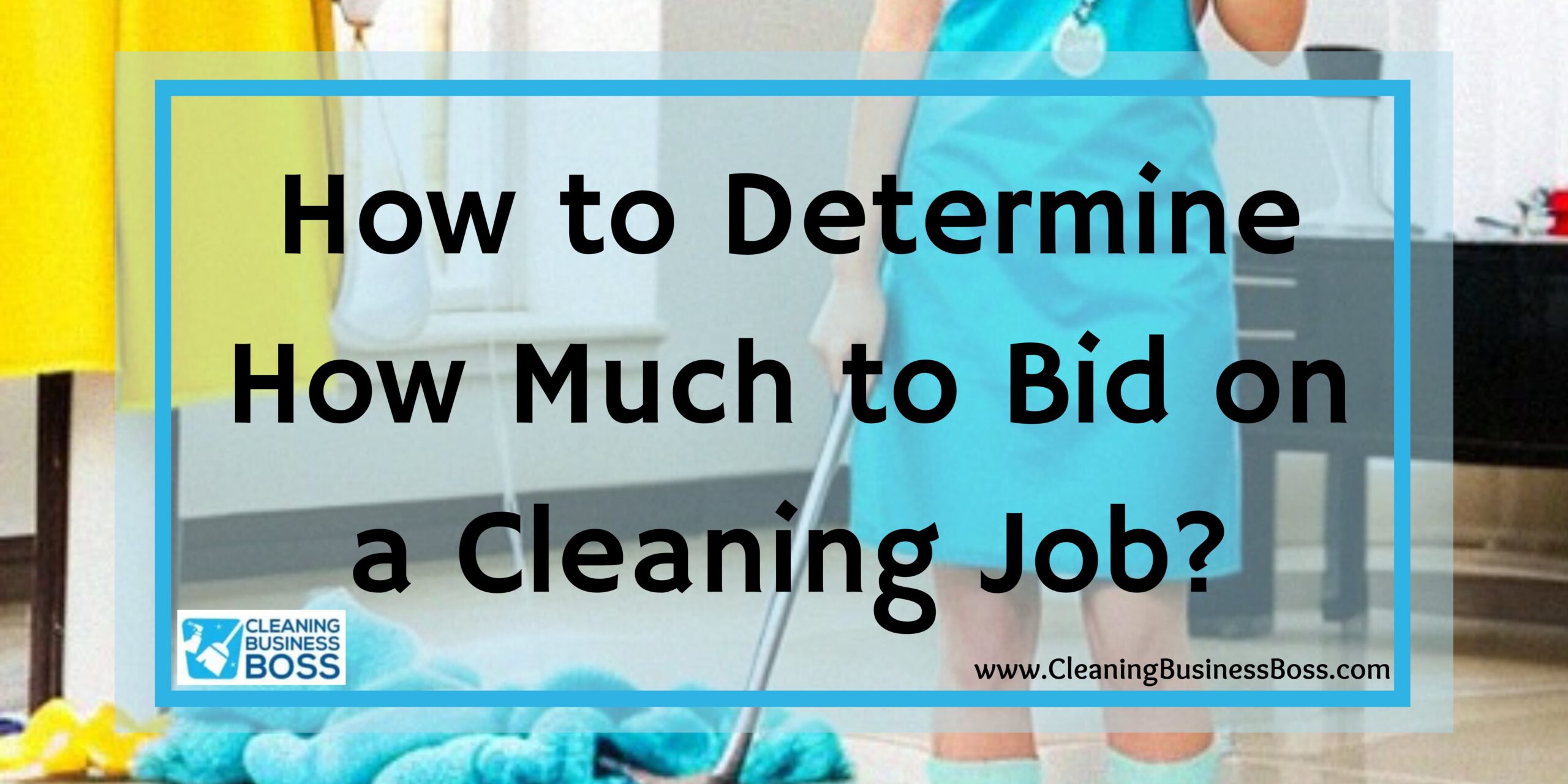So you’ve decided to start your very own cleaning business. You’ve picked out a name, bought all the supplies you’ll need, and landed some leads for customers. Now it’s time to determine how much to bid on these upcoming cleaning jobs so that you can offer a competitive price while making enough profit to sustain and grow your business.
To determine how much to bid on a cleaning job, you need to aim to pay yourself $25-$45 an hour. This means calculating the number of hours spent at the job a week and multiplying by 4.3, which is the number of weeks in a month. Once you know how many hours you will spend a month, multiply that by your desired hourly rate and that will give you the rate to bid on the job.
Your hourly rate should largely depend on your competition and what average rates are in your area. While it is important to establish a client base by winning job bids, doing so by charging a much lower hourly rate than others in your area will make your company much less profitable. It’s important to understand that your bid will determine how successful a job is for your company. There are a few more factors to be considered when bidding on new jobs.
How Long is the Job Going To Take?
There is no exact formula for determining the amount of time per visit it’s going to take you. A conversation that happens over the phone may lead you to believe that you’re walking into an easy 1,000 square foot job that will take you 30 minutes, but when you show up you find out it’s full of appliances, sinks, toilets, and not an inch of carpet – break out those mops and gloves. You will quickly find that a one size fits all approach to bidding on jobs isn’t necessarily the best idea in the cleaning business. Spend the extra time evaluating the job and what it is going to entail on the front end of things rather than find out later you didn’t ask enough questions.
Take a Walk
The most accurate way to determine how long a cleaning job will take you is to meet with the client and walk the site. You will need to take notes on appliances that will need to be cleaned, floors that need to be mopped, the general size of each room, and the degree of difficulty of the job. This is also a great time to discuss any special needs the potential client may have and any special products you will need. Note that special products equal special pricing. Make sure you add in the cost of any additional product the job needs that you don’t normally have on hand.
After walking the premises, review your notes and get an estimate of the time needed for each visit. Don’t lowball the time – be accurate and even add in some extra time for unexpected tasks you may run into.
Check out this article to know how to collect payments for your cleaning business.
How Much Should I Get Paid?

Your hourly rate is something that needs to be decided upon prior to discussing numbers with a client. Typically, the hourly rate is $25-$45. In order to really hone in on the number that is best for you, it’s a good idea to scout your competition. Make some calls to various cleaning companies nearby and see if you can determine what they are charging per hour. It may be difficult for you to get an exact “per hour” number out of them, but you can ask leading questions like “what is a typical cost or a price range” for the specific type of job you are looking for. It’s not too hard to do some quick math to find out what your competition is looking to collect per hour. If you are new to the business, consider starting at the lower end of the spectrum to gain some experience and build clients that are looking for the lowest price. That being said, don’t price yourself too low and lower your chances of becoming successful and profitable!
One and Done – Single Cleaning Visit
Not all jobs you may bid on will be recurring. If you come across someone with a onetime need of your services and you are able to work a deal that puts your business in the positive, throw your name in that bid hat!
Some examples of these type of jobs are
- move out cleanings
- post-construction or remodeling cleanup
- special projects like attics, basements, and garages
You must charge by the hour for these types of jobs and not give them a price for the entire job. These special circumstances type of jobs have the potential to throw the unknown at you. When taking a look at the surface of these jobs, it’s very difficult to judge the different obstacles and difficult tasks you may run into. Don’t make a bad deal for yourself and end up losing money and time on one of these jobs because you agreed on a price that’s fit for 5 hours of work when it really takes you 10 hours. These types of jobs may require special products or disposing of leftover materials. Factor in your cost of these items into your bid to make sure you’re not cutting into your bottom line.
Other Things to Consider

It’s a little easier to calculate your rate when you are the only employee. If you are employing others, it’s important to ensure the job is paying enough to cover the overhead expenses of having an employee in addition to paying your salary and having a little extra leftover for the company to grow with.
When discussing the frequency of visits with your potential clients, keep in mind that spending fewer days per week at the site, in turn, will mean spending more time per visit at the location. With more time in between cleanings, there is more time for things to become dirtier and we all know that the dirtier it is, the more time consuming it is. It may be more beneficial for you to work out a higher frequency of days so you spend fewer hours during each visit.
If after winning a bid and working on the site for a while you find that you’ve underestimated the time needed, don’t be afraid to renegotiate with your client. If you have been providing quality services, the client will likely recognize and continue the professional relationship with you rather than starting the process over with a new company. After all, there is a reason you won the bid, to begin with – likely because your competition gave higher rates, the rates you can renegotiate for.
Get the most bang for your buck (or in this case your location). Try to bid on jobs that are near clients you are already working with. Obviously, that’s not always possible. In cases where your clients aren’t close to each other, try to acquire your new business in centralized locations that will enable you to easily get from one job site to the next without eating into your profits by traveling long distances.
Thinking a new vehicle for your cleaning business? Visit this article here.
Frequently Asked Questions
What type of cleaning job is better – residential or commercial?

The type of cleaning job that is “better” depends on your preference and what works best for your situation. The upside of residential jobs is that you normally develop a long term client base with more security of maintaining the job. These types of customers aren’t looking to replace you unless they’re unhappy with your services. In contrast, commercial jobs will have constant competition with other cleaning companies constantly trying to pull your clients out from under you. Another key point when talking about residential vs commercial jobs is the amount of transit time needed to get to the sites. It’s likely that with residential clients you will be spending less time at the job sites than you would at commercial which means more time commuting in between residences. Something else to consider with commercial accounts is that most of the cleaning takes place after hours. At some places this may mean 5:00 PM, at others it may mean midnight. The third shift gigs aren’t the best to bid on if you aren’t necessarily a night owl.
How do I maximize the money that I make on each job?
The most accurate answer here is to negotiate a fixed, monthly price like we have been discussing, and then get the work done as quickly and efficiently as possible. This doesn’t mean to start skipping tasks and short change your client on quality. It means to develop a system at the site where you have a good flow, are doing tasks in an order that makes sense, and in a way where you aren’t backtracking. You are there to clean up after other people, not yourself! By putting a routine in place you will complete the job quicker than the amount of time you quoted them for and maximize the money you make per job.
To learn more on how to start your own cleaning business, check out my startup documents here.
Please note that the contents of this blog are for informational and entertainment purposes only and should not be construed as legal advice. Any action taken based on the information provided in this blog is solely at your own risk. Additionally, all images used in this blog are generated under the CC0 license of Creative Commons, which means they are free to use for any purpose without attribution.

About the author. Entrepreneur and Cleaning Business Fan.
Hi! I am Shawn and I am a happy individual who happens to be an entrepreneur. I have owned several types of businesses in my life from a coffee shop to an import and export business to an online review business plus a few more and now I create online cleaning business resources for those interested in starting new ventures. It’s demanding work but I love it. I do it for those passionate about their business and their goals. That’s why when I meet a cleaning business owner, I see myself. I know how hard the struggle is to retain clients, find good employees and keep the business growing all while trying to stay competitive.
That’s why I created Cleaning Business Boss: I want to help cleaning business owners like you build a thriving business that brings you endless joy and supports your ideal lifestyle.

